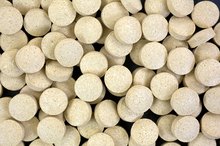Diet for Ulcerative Colitis with Gas
Undigested food your body does not break down passes along the digestive tract into your large intestine, where it meets harmless bacteria. As the bacteria works to break down the food, gaseous hydrogen and carbon dioxide are produced, which are excreted from the rectum. In people with ulcerative colitis, a different form of gas is also created, causing foul odorous flatulence. A change in dietary habits can reduce the amount of gas you experience as well as reduce symptom flare-ups of the disease.
About Ulcerative Colitis
Ulcerative colitis is an inflammatory bowel disease of the large intestine or colon. No specific cause has been identified, but hereditary factors and autoimmune reactions from bacteria or virus may contribute to disease development. Rectal bleeding, abdominal cramping and pain, fatigue and weight loss are symptoms associated with this condition. In rare cases, ulcerative colitis may become life-threatening, causing colon rupture, toxicity and shock. Treatment aims to reduce symptom incidence and inflammation with medications or surgery but no cure for the disease exists. Diet does not cause ulcerative colitis but some foods can worsen symtpoms and produce discomfort from gas.
Toxic Gas
Pregnancy Diet to Avoid Gassiness
Learn More
Experiencing gas is normal and people without ulcerative colitis produce some gas from methane and some from hydrogen sulfide gas, which digestive enzymes and healthy bacteria in the colon work to detoxify. People with ulcerative colitis, however, primarily produce hydrogen sulfide gas that remains toxic because of a deficiency of enzymes and good bacteria; thus, an acidic environment for the toxic gas to subside does not exist. According to Jackson GI, limiting sulfur-containing foods in your diet can increase the healthy bacteria in your colon, making it more acidic and inhospitable for hydrogen sulfide gas-producing bacteria to grow.
Gas-Producing Foods
Sulfur-containing foods are important in your diet; however, you must limit them if you have ulcerative colitis because your body is unable to inhibit the toxic effects of the sulfate you consume. Red meat has a high concentration of sulfate, which increases hydrogen sulfide gas in your colon. Moderate sulfates also occur in dairy products, nuts, cruciferous vegetables like broccoli or cabbage and dried fruits. Beer, wine, apple and tomato juice contain sulfate. Consumption of these types of foods may also increase your risk of ulcerative colitis relapse after a period of remission, notes the "International Journal of Gastroenterology and Hepatology."
Dietary Tips
What Are the Causes of Belching & Diarrhea?
Learn More
No specific diet is designed for ulcerative colitis, but if you keep a food journal, you can determine what to eat and what to avoid. Nutritional deficiency is a complication of ulcerative colitis, but working with your medical team can help you find a diet plan to meet your needs. Consume smaller, more frequent meals instead of large-portioned meals. High-fiber foods may irritate your digestive system so you may want to avoid raw fruits or vegetables and opt to steam produce or remove the skins to limit the fiber. White grains may cause less bloating and gas than wheat or whole-grain products. Choose fish or baked skinless poultry instead of red meat and limit saturated and trans fats like butter or fried foods.
Related Articles
References
Writer Bio
Aubri John has been a contributing researcher and writer to online physical and mental health oriented journals since 2005. John publishes online health and fitness articles that coincide with her licensed clinical skills in addictions, psychology and medical care. She has a master's degree in clinical social work and a Ph.D. in health psychology.









